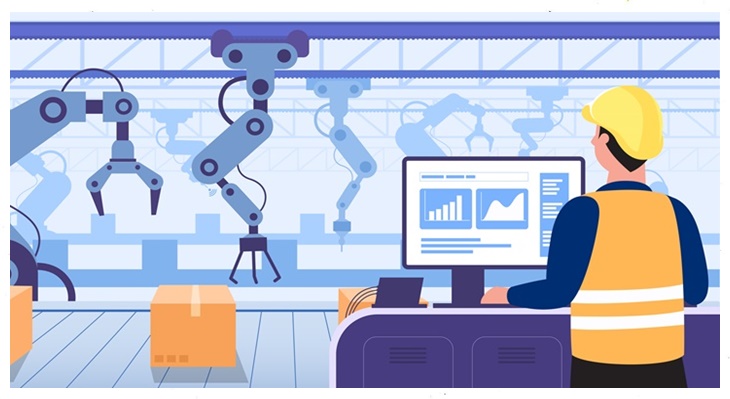Industrial Automation Tools play a crucial role in helping businesses save cost and time. The tools are also an important aspect in various industries like finance, healthcare, manufacturing, etc.
Above all, industrial automation tools offer a variety of equipment to help businesses in testing and process automation. Most importantly, the tools help generate digital and mechanical alternatives as well as ensure quality control and product development. As a result, these tools help businesses worldwide and across industries.
Hence, in this article, we will learn about the different types of industrial automation tools. However, let us first understand more about Industrial Automation tools and their importance.
Types and Examples of Industrial Automation Tools Businesses should know of
What are Industrial Automation Tools?
Industrial Automation Tools are the technologies that control and manage systems and devices. Moreover, these tools reduce the possibility of human errors, decrease costs, save time, etc.
It also improves done efficiency and reliability of process control systems like computer software and robotics. As a result, it enhances the quality of products and offers more precision and accuracy while performing tasks.
Therefore, in the age of Industry 4.0 that introduces the concept of smart factories, industrial automation and its tools introduce more solutions. In addition, it helps various digital and mechanical innovations to smoothen manufacturing processes.
Importance of Industrial Automation Tools
- Firstly, industrial automation tools enable factories to run 24/7 for continuous mass production. Hence, it enhances productivity and reduces the time for assembly.
- Moreover, adaptive control and management of different stages in the process reduce the chances of human error. Thus, it increases the quality and homogeneity of the products.
- Furthermore, it is evident that machines and systems produce tasks consistently and at a continuous pace. As a result, industrial automation tools play a major role in automating manufacturing processes. Hence, these processes run for a longer duration, allow stability, and guarantee uniformity within the system.
- Introducing a new task or process in a traditional product chain often utilizes hours and days off of production time. It may also hamper the quality and consistency as mastering a new skill requires time and practice.
Whereas, in an automated process, users can simply reprogramme a robot, machine, or system. Hence, providing a quick and simple solution with higher flexibility in the process. - There are multiple sets of data produced during the implementation of tasks and processes. Meanwhile, there are multiple sources that collect the data and convert them into actionable insights. Hence, these actionable insights can help businesses make more accurate decisions that may reduce costs.
- It also offers safety for human resources by using robots or other machinery on production lines under difficult working conditions. Therefore, it adheres to the Occupational Safety and Health Act of 1970, to safeguard employees and improve job safety.
SCADA
SCADA stands for Supervisory Control And Data Acquisition. It refers to the type of application that collects actionable data. Moreover, the data is useful to manage, monitor, and optimize a system.
Above all, SCADA is applicable in petrochemical distillation processes, water filtration systems, pipeline compressors, etc. As a result, it enables businesses to work on requirements and enhances the return on assets through operational achievements. Hence, this type of industrial automation tool provides a competitive advantage by identifying newer methods for leaner and faster operations.
Programmable Logic Controller
A Programmable Logic Controller or PLC is a robust digital industrial computer control system. It is preprogrammed to execute automatic operations in the manufacturing process.
Moreover, it continuously monitors and receives information from input devices or sensors. Further, it processes the information and then alerts the output devices to complete the tasks.
Human Machine Interface
Human Machine Interface or HMI consists of electronic devices that help signal and control the state of the process equipment. Therefore, it is a software application that allows interactions and communication between a human operator and the machine or production system.
Moreover, it translates complex data into actionable information. As a result, providing better management of the production process and its applications.
Artificial Neural Network
Artificial Neural Network or ANN is a neural network industrial automation tool. Moreover, it is a mathematical model and processes information from biological networks.
As a result, the structure of ANN can change both externally and internally depending on the data. Furthermore, the data must be fed in the initial learning phase of the system. Hence, applications of this industrial automation tool include financial solutions and data mining.
Distributed Control System
Distributed Control System aka DCS is one of the most popular industrial automation tools. It also caters to multiple processes in the manufacturing industry. Moreover, it contains one or more controller components distributed in the system.
For instance, the broad categories of application of DCS are electrical power grids, generation plants, traffic signals, water management systems, etc.
Robotics
Robotics is one such technology that is used globally. It applies in surgery, entertainment, customer service, etc. Moreover, robots help humans complete complex tasks more efficiently.
It is also helpful in performing different application tasks. For instance, allocating, painting, welding, repairing, etc. Robotics is the future of industrial automation tools. Hence, it plays an important role in production processes.
ABB
ABB is a Swiss technology leader that offers digital connections and enables industrial equipment and systems. Consequently, they popularly offer robotic solutions. Moreover, they are available in more than 100 countries and employ over 36000 individuals.
Further, their most notable technology is the YUMI single-arm which is a small parts assembly solution. It was introduced in 2017 and was the world’s first cobot.
According to Ulrich Spiesshofer, CEO, ABB, “YuMi makes collaboration between humans and robots a reality. It is the result of years of research and development, and will change the way humans and robots interact.”
Siemens AG
Siemens AG is a global provider of electrification, automation, and digitization. Moreover, the company employees over 372,000 from more than 200 countries.
Sinumerick CNC 840D sl is a machine tool handling system from 2017. Furthermore, its latest software, a 4.8 release provides an advanced productivity feature. It also boosts speed, provides precision, and guarantees safety.
Above all, its superior system flexibility offers handling processes like milling, turning, grinding, etc.
Uwe Armin Ruttkamp, Head of Machine Tool Systems, states, “The end-to-end digitalization approach taken by Siemens encompasses not only hardware but also software along the entire value chain from design to machine tool application, enabling our customers from the machine tool industry to achieve a significant boost to their productivity.”
KUKA Robotics
KUKA Robotics is a Chinese-owned company based out of Augsburg Germany. It is one of the leading manufacturers of industrial robots, plant manufacturing, and system technology. Moreover, it has around 25 global subsidiaries and is a pioneer in industrial automation.
Hence, its latest solution OmniMOVE KUKA Mobile Platform 1500 is a logistics vehicle. It provides manufacturing vehicles precision and unlimited 360-degree agility. Further, it is an autonomous solution that enables flexibility and reduces the usage of floor space.
According to Jonas Glimdén, CEO, KUKA Nordic, “The new mobile platform KMP 1500 is our answer to the increased demands made by the manufacturing industry on shorter response times and greater flexibility in the manufacturing process. It permits flexibility in production that was previously inconceivable.”
Bosch RexRoth
Bosch RexRoth is a global leader that provides drive and control technology. It certainly includes products like hydraulics, electric driver & controls, gear technology, etc.
Moreover, its solution is the ActiveAssist, an assembly assistance system for a smart workstation. It offers an intuitive platform that enables users and employees to access all information in the process. It also directs the assembly processes at each stage. Hence, it indicates errors and intervenes to correct them. As a result, it brings quality and productivity in the process and is the ideal solution for Industry 4.0.
Bosch Rexroth PR states, “The ActiveAssist open software solution is another building block on the road to the factory of the future in which employees are supported in their tasks by connected solutions.”
Conclusion:
In conclusion, Industrial Automation tools and solutions assist to ease the tasks and optimize resources. Companies depend on these tools that keep evolving and creating great impacts on various industries.
Also Read:
The Evolution and Future Scope of Industrial Automation

